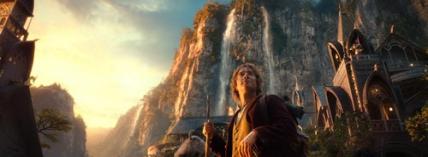The Hobbit: An Unexpected Journey
The dwarves have all the best songs. Whether they are singing raucous ditties about smashing Bilbo’s best crockery or low, mournful dirges about retrieving long-lost gold, Peter Jackson’s dwarves are a musical bunch, and all without a hint of hi-ho.
In Search of Home

There’s more to the dwarves than first meets the eye. The opening scenes of historical exposition warn us that all of the dwarves’ problems stemmed from their love of gold. The great kingdom of Erebor was lost because King Thror hoarded his treasures, attracting the attentions of an even greater lover of precious metals, the dragon Smaug. Smaug terrorised the land and drove the dwarves away, settling down to bask the years away in his ill-gotten gains. Thror’s people, meanwhile, became a people in exile, left to wander the lands and eke out a living as best they could.
Our first encounter with Thorin Oakenshield (Richard Armitage) – Thror’s grandson – and his band of comrades suggests that they too are all about the gold. It is only as we travel with them that we begin to see that the yearning to restore their people to their rightful home has a far stronger pull on their hearts. These are a people who have known for decades that they aren’t where they should be. When the chance comes to put that right, they don’t intend to let anything get in their way.

Bilbo Baggins (Martin Freeman), like the dwarves, needs to find his place in the world. The only difference is that he thinks he’s already there. While the dwarves have a keen sense of being dispossessed exiles, Bilbo is perfectly happy in his hobbit-hole, with his pipe tobacco and his well-stocked pantry. Like most hobbits, he’s happy to be sociable and to entertain guests, just so long as they aren’t unexpected or disreputable. He enjoys his comfortable home and has absolutely no interest in adventures. For Bilbo, other people are to be kept safely at arm’s length.
Gandalf (Ian McKellen) has to remonstrate with Bilbo, whom he knew as a young hobbit, telling him that, "The world is not in your books and maps. It’s out there." What Bilbo needs is to get out in the world, to get involved and to be changed by the experience. Reluctantly, and for reasons that aren’t entirely clear even to him, Bilbo agrees and joins forces with Gandalf and the dwarves. During the first part of their adventures (the film only takes us up to the end of Tolkien’s sixth chapter), we see Bilbo come to realise that his life should be about more than home comforts.

When Bilbo flippantly remarks that the dwarves should be used to not belonging anywhere, he sees the hurt this causes Bofur (James Nesbitt). As Bilbo begins to identify with the dwarves’ cause, it’s an important part of the transformation that Gandalf warned Bilbo would happen to him on his adventures. Even though Bilbo has a home to go to, he now realises that life isn’t about keeping a safe detachment from others, it’s about sharing with them. He tells Thorin that, "You don’t have [a home]; it was taken from you. But I will help you take it back, if I can."
In a council at Rivendell, Gandalf observes that it is, "the everyday deeds of ordinary folk that keeps the darkness at bay: simple acts of kindness and love." Bilbo’s willingness to throw his all into Thorin’s quest shows that he is beginning to grasp the importance of focusing his life on more than just himself.

The importance of finding where we belong is easy to overlook. Communities are more transient and people are more mobile today than ever before, relocating vast distances for a variety of reasons. The days when most of us would have a hobbit-like existence in one small corner of the globe are long gone. For some people this produces a sense of rootlessness, while others find a secure identity for themselves without much difficulty. For Christians the situation isn’t quite so simple. Christians believe that all of us were made for this world. However, humanity’s rejection of God’s ways mean that Christians are, like the dwarves, strangers in the world, holding onto their ways and seeking to be restored to their kingdom. In the Bible, Jesus talks of his followers being "in the world", but not "of the world" (John 17:11). Christians, like the dwarves, should be used to the thought that they are searching for their home.
It’s easy to look at that from the outside, thankful that we’re not in that position, but how many of us might not be a little like Bilbo – complacently thinking that we are already where we ought to be, when actually we still have much to learn about life, home and belonging? No matter how comfortable our life may seem, perhaps we will only find a true homecoming when we can join with Balin (Ken Stott) and say, "There is one I could follow, there is one I could call King."
Film title: The Hobbit: An Unexpected Journey
Keywords: Belonging, home, identity, greed, change
Director: Peter Jackson
Screenplay: Fran Walsh, Philippa Boyens, Peter Jackson, Guillermo del Toro, based on the book by J.R.R. Tolkien
Starring: Martin Freeman, Cate Blanchett, Elijah Wood, Ian McKellen, Andy Serkis
Distributor: Warner Bros. (USA/UK)
Cinema Release Date: 13 December 2012 (UK); 14 December 2012 (USA)
Certificate: PG-13 (USA); 12A (UK) Contains moderate violence
Related articles / study guides
© 2012 Steve Couch 2012



